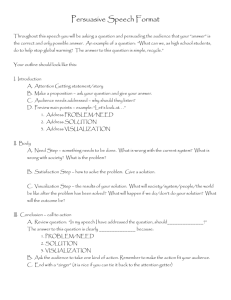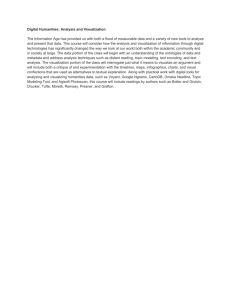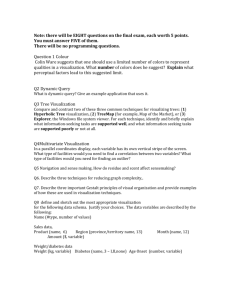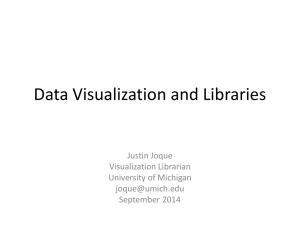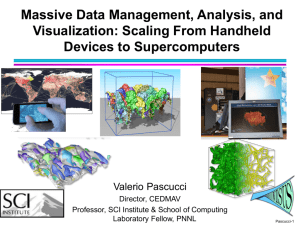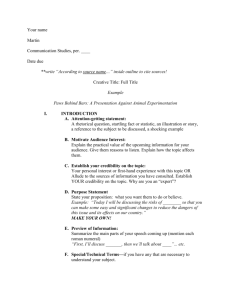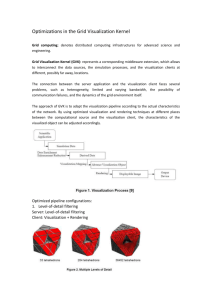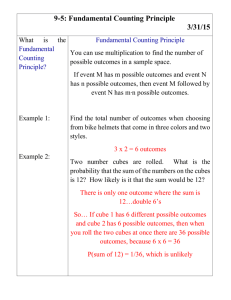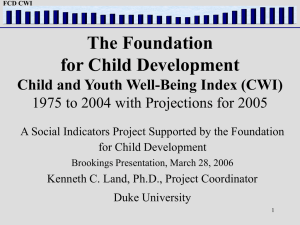Visualisation - VL-e
advertisement
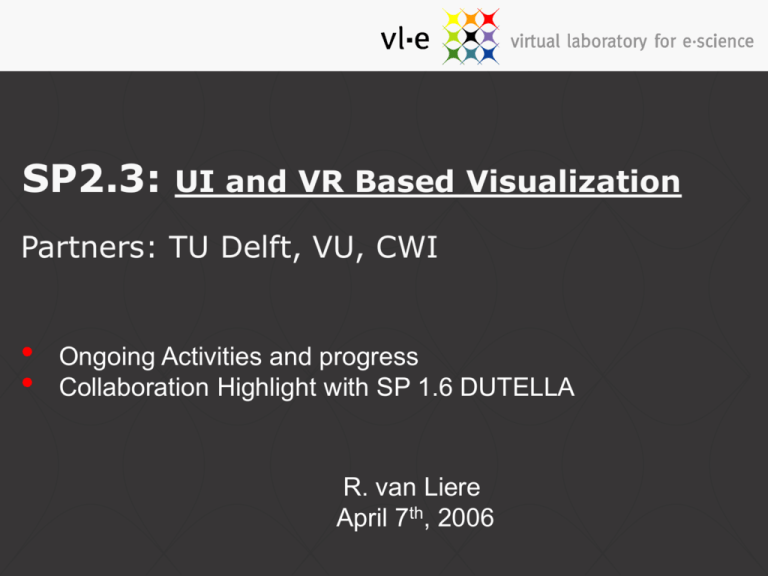
SP2.3: UI and VR Based Visualization Partners: TU Delft, VU, CWI • • Ongoing Activities and progress Collaboration Highlight with SP 1.6 DUTELLA R. van Liere April 7th, 2006 SP 2.3 people 4 PhD students: Broersen, Burakiew, Kruszynski van der Schaaf (CWI) (VU) 3 PD: Botha, Koutek de Leeuw (TUD) (CWI) 4 supervision: van Liere Post, Jansen Bal (CWI) (TUD) (VU) SP2.3 ongoing activities Multi-spectral visualization Particle visualization Confocal Cell Imaging Volume measuring Medical Imaging Virtual Reality on the GRID Distributed Scene Graphs SP 1.6 SP 1.6 SP 2.1 SP 1.4 SP 3.1 SP 3.1 SP 2.3 status 25 international publications 2 spin-offs Foldyne (TU Delft) Personal Space Technologies (CWI) Projected output 4 PhD thesis At least 2 packages in PoC Collaboration SP 1.6 DUTELLA Prof Ron Heeren (ALMOF) Topic: Mass Spectrometry for molecular imaging Motivation: need for better MS analysis tools Visualization Topics: Multi-spectral data visualization In-silico mass spectrometry Envisioned output: GRID enabled toolbox for MS analysis Applications according to VL-e methodology Problem: aligning multi-spectral data cubes Multi-spectral data cube: 256x256x65k Multiple data cubes ±100 cubes in mosaic Current procedure: manual alignment on pixel values Our novel approach Idea: Align spectral features in adjacent samples Approach: Compute spectral features using PCA For each feature, find a most optimal spatial alignment of the feature The overall spatial alignment is optimal for all features MS beelden dijbeen muis First Spectral Feature = Principal Component1 Second Spectral Feature Principal Component2 Minima landscape use the combination of 2 local minima Minimization map of 1st feature Minimization map of 2nd feature Impact ? Generic ? GRID? Faster, unsupervised objective reproducible alignment combined with VL inspection tools for SP1.6 Method can also be applied to multispectral data cubes from other types of microscopes/telescopes. Data-cube:256x256x65K. 100 cubes. Alignment:15min in Matlab. Combinations: (100 2) * 15 Problem: Meaningful ion dynamics Ion clouds: ~50k ions x 1M steps Current visualizations are low level, eg.: But how about: Intra ion-cluster interactions and their causes Intra ion-cluster interactions? Our novel approach Idea: simplify images with Statistical parameterized icons Semantic camera control Approach: Parameterized “comet-icons” Camera motion relative to comet dynamics Example: icons Ions groups Statistical ion properties of group Ion density dynamics Example: camera control Trapping motion Relative cyclotron frequency Tracks of Frenet frames Impact ? Generic ? GRID? Improvement of mass accuracy understanding/control leads to enhanced protein ID in proteomics Software framework is targeted towards particle visualization. Semantics of icons/cameras can be added/changed/enhanced Near-future: optimization of simulation initial conditions Final SP 2.3 comments SP 2.3 is well on track Projected output: GRID enabled toolbox Applications using toolbox SP2 layer SP1 layer However: visualization PhDs are not mass spectrometry scientists!
